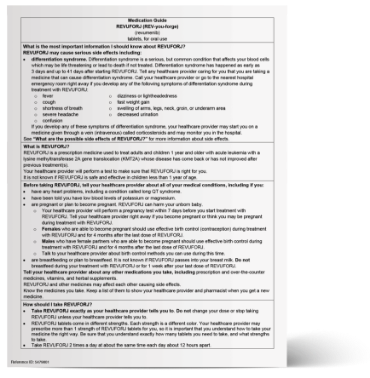Helpful Resources
Helpful tools & resources about Revuforj
The following tools and resources are designed to help you stay informed and feel supported as you or your loved one begins treatment with Revuforj.

Patient Brochure
Explains how Revuforj works and what to expect during treatment.
Differentiation Syndrome Wallet Card
Provides important information that you should keep with you at all times.
Medication Tracker
Helps you keep track of your dosing schedule and plan a Revuforj routine.

Medication Guide
(with Instructions for Use)
Gives an overview of all the important information you should know about Revuforj, including the Instructions for Use.

Full Prescribing Information
Includes detailed information about Revuforj for healthcare professionals.

Instructions for Use video
A step-by-step guide that follows the Instructions for Use (this information does not take the place of talking with your healthcare provider).
Have an upcoming appointment?
Consider asking your healthcare team these questions if you or your loved one are considering or starting treatment with Revuforj:
-
What makes Revuforj right for me?
-
What do I need to know about my genetic testing results?
-
How is Revuforj different?
-
Is Revuforj covered by my insurance?
-
When and how will I know if Revuforj is working?
-
What side effects do I need to look out for?
-
Are there certain foods or activities to avoid while taking Revuforj?
-
Is it safe to take other medications or supplements while taking Revuforj?
-
How long will I stay on Revuforj?
-
As a caregiver, is there anything specific I should know?
Use the definitions below to help familiarize yourself or others with common medical terms
Acute
Symptoms or signs of a disease that begin and worsen quickly if not treated
Acute lymphoblastic leukemia (ALL)
A fast-growing cancer in which too many lymphoblasts (a type of immature white blood cell) are found in the blood and bone marrow. Also called acute lymphocytic leukemia
Acute myeloid leukemia (AML)
A fast-growing cancer in which too many myeloblasts (a type of immature blood cell) are found in the bone marrow and blood
Anemia
A condition in which the number of red blood cells is below normal, sometimes causing fatigue and shortness of breath
Blast
An immature blood cell
Bone marrow
The soft, spongy tissue in the hollow middle of certain bones of the body. This is where new blood cells are made
Cytopenia
A low number of healthy blood cells in the body
Efficacy
Effectiveness; the ability of a treatment to produce the desired result
Hematologic
Of or relating to blood
Neutropenia
A condition in which there is a low number of neutrophils (a type of white blood cell), so the immune system can’t effectively fight against infection
Refractory
A disease or condition that does not respond to treatment
Relapsed
When a disease, or its signs and symptoms, returns after a period of improvement
Response
An improvement related to treatment
Side effects
Unwanted effects of treatment
Sign
A physical change that can be seen or measured by someone else, such as fever or bleeding
Stem cell
Immature blood cells (also called hematopoietic stem cells) found in the bone marrow and in the blood that can mature into all types of blood cells
Stem cell transplant
A procedure in which a person receives healthy stem cells to replace their own stem cells. A stem cell transplant may be autologous (using a person’s own stem cells that were collected and saved before treatment), or it may be allogeneic (using stem cells from a related or unrelated donor)
Symptom
A change in the body that is noticed by the person who has it, such as pain or fatigue
Targeted therapy
Treatment that uses drugs or other substances to identify and attack certain cancer cells. Targeted therapies tend to affect normal cells less and may cause fewer side effects than other cancer treatments
Thrombocytopenia
A condition in which there is a low number of platelets in the blood, increasing the risk of bruising and bleeding
Transfusion
A procedure in which blood or parts of blood are put into a person’s bloodstream through a vein (intravenous or IV)
Translocation
A genetic change in which a piece of one chromosome (part of a cell that contains genetic information) breaks off and attaches to another chromosome
Use the definitions below to help familiarize yourself or others with common medical terms
Acute
Symptoms or signs of a disease that begin and worsen quickly if not treated
Acute lymphoblastic leukemia (ALL)
A fast-growing cancer in which too many lymphoblasts (a type of immature white blood cell) are found in the blood and bone marrow. Also called acute lymphocytic leukemia
Acute myeloid leukemia (AML)
A fast-growing cancer in which too many myeloblasts (a type of immature blood cell) are found in the bone marrow and blood
Anemia
A condition in which the number of red blood cells is below normal, sometimes causing fatigue and shortness of breath
Blast
An immature blood cell
Bone marrow
The soft, spongy tissue in the hollow middle of certain bones of the body. This is where new blood cells are made
Cytopenia
A low number of healthy blood cells in the body
Efficacy
Effectiveness; the ability of a treatment to produce the desired result
Hematologic
Of or relating to blood
Neutropenia
A condition in which there is a low number of neutrophils (a type of white blood cell), so the immune system can’t effectively fight against infection
Refractory
A disease or condition that does not respond to treatment
Relapsed
When a disease, or its signs and symptoms, returns after a period of improvement
Response
An improvement related to treatment
Side effects
Unwanted effects of treatment
Sign
A physical change that can be seen or measured by someone else, such as fever or bleeding
Stem cell
Immature blood cells (also called hematopoietic stem cells) found in the bone marrow and in the blood that can mature into all types of blood cells
Stem cell transplant
A procedure in which a person receives healthy stem cells to replace their own stem cells. A stem cell transplant may be autologous (using a person’s own stem cells that were collected and saved before treatment), or it may be allogeneic (using stem cells from a related or unrelated donor)
Symptom
A change in the body that is noticed by the person who has it, such as pain or fatigue
Targeted therapy
Treatment that uses drugs or other substances to identify and attack certain cancer cells. Targeted therapies tend to affect normal cells less and may cause fewer side effects than other cancer treatments
Thrombocytopenia
A condition in which there is a low number of platelets in the blood, increasing the risk of bruising and bleeding
Transfusion
A procedure in which blood or parts of blood are put into a person’s bloodstream through a vein (intravenous or IV)
Translocation
A genetic change in which a piece of one chromosome (part of a cell that contains genetic information) breaks off and attaches to another chromosome
SyndAccess® Patient Support
How the SyndAccess support team may be able to help you or your loved one
Navigate Insurance
SyndAccess nurses can answer questions about insurance and your coverage. Our team can investigate your insurance benefits and assist with the prior authorization process to help you or your loved one start treatment.
Help Paying for Medication
If you cannot afford your medication, SyndAccess may be able to help. Ask your healthcare team about enrolling and to see if you are eligible for the program.*
Provide Personalized Support
Our team of SyndAccess nurses are here to answer questions, check in with you, and listen when you need support.

Visit SyndAccess.com or call us at 1-888-567-SYND (7963) to learn more.
-
*All SyndAccess programs are subject to eligibility requirements and changes. Eligible commercially insured patients can apply for copay support through the Revuforj® (revumenib) Copay Program. Must be a US resident or US territory resident with a valid prescription. Restrictions apply.
Support & Advocacy
Find support from the community around you
Whether you’re living with acute leukemia or caring for someone who does, you are not alone. Connecting with the community can provide additional support and resources. Consider contacting these organizations to learn about services and support in your local area. You could even meet others who have walked the path you’re on.
Support for all ages:
Support for children and adolescents/young adults (AYA):
Syndax is not affiliated with the organizations mentioned above and is not responsible for the content or availability of these resources. The information provided is for educational purposes only and is not meant to replace the advice of a healthcare professional.
Raising awareness
makes a difference
April 21:
AML World
Awareness Day
September:
Blood Cancer
Awareness Month
Actor portrayal.
